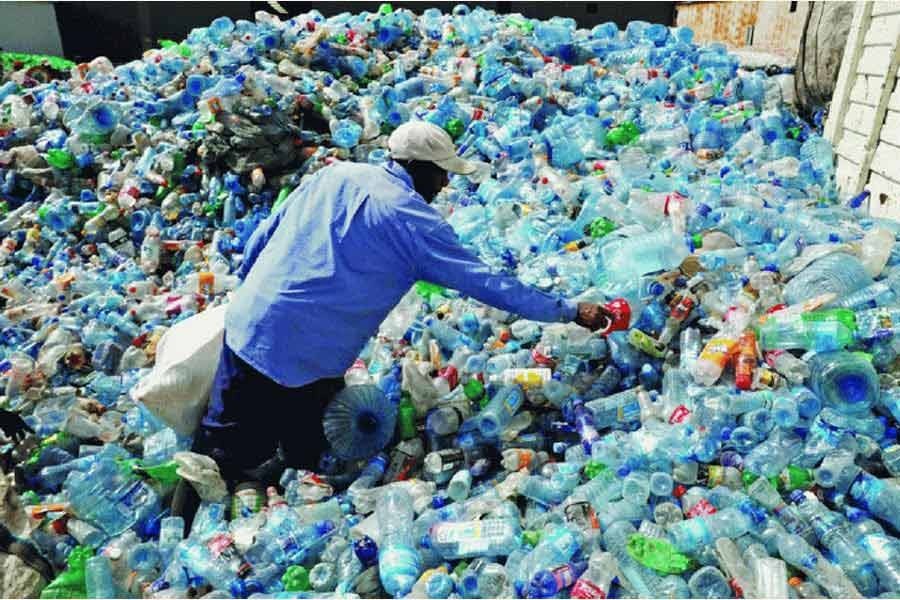It may be called a plastic deluge or invasion or even hegemony. What is important is to understand the role of this cheap material in human and other life forms on this planet. In other words, how plastic is helping advance or putting in peril the environment and civilisation. Modern life is unthinkable without plastic. But before 1950, people hardly used plastic in their daily life. Even between 1950 and 1970 production of this non-biodegradable substance was limited and therefore its waste in the natural environment was insignificant and manageable.
Since then in just two decades, production of plastic tripled and so did its waste generation. In the next three decades, the substance has seen a proliferation 20 times more and if the trend continues it is likely to quadruple by 2050. Now the most important question is, if the all-pervasive sweep of this substance was necessary. Is it serving the mankind and other animals, the marine life in particular, well?
Plastic economy has blinded policymakers the world over. Now the issue has turned critical with plastic hegemony taking over its inventor and manufacturer of the array of its attractive products. People everywhere, particularly in urban centres, have literally become addicted to single-use plastic with disastrous environmental consequences. It is a most uneasy feeling for anyone to know that across the world one million water bottles are sold and bought every minute and five trillion one-time plastic bags are in use every year. In reality, half of the plastic goods produced are meant for single-use and then discarded.
No wonder environmental scientists have agreed that the instant random use and disposal of plastic may be a geological indicator of the Anthropocene epoch. Of the most remarkable human fingerprints, plastic pollution compared to mercury or other material is likely to be greater and more telling. So it is time to be aware of the danger of plastic not only to life and livelihoods but also to other life forms, marine life in particular. The 300 million tonnes of plastic waste generated annually weighing almost equivalent to the weight of the entire human population overwhelm the planet's physical space including its water bodies and oceans.
This is proof enough that human beings are producing a substance well beyond their needs and all limits. They must restrain its production to the minimum possible in their own interests and rationalise its use to the extent where it is unavoidable and serves humanitarian purposes such as life-saving. There is no point promoting the use of a substance that is not biodegradable and littered all around as if people are on a sporting spree. Its immediate consequences are choking of drains, canals and death to sea creatures such as dolphins and whales. But the long-term consequence will be soil degradation leading to food insecurity.
An objective analysis will definitely show that the harms will outweigh benefits before the human race comes to realise the poisonous fruits they may have to reap out of their indiscreet act. This has happened in case of fossil fuel use and generation of CO2 or the greenhouse gas. Promotion and use of plastic in daily life should have been limited long before but it has, unfortunately, not happened.
Now that plastic has come to stay because of its use in electronic, healthcare, aviation and other important areas of life, options for alternative in those sectors will not be wide. But household and personal use of plastic commodities can certainly be limited. The other choice would be to produce plastic goods of such designs and qualities as can easily be collected for recycling and reuse.
Against this backdrop, where does Bangladesh stand in terms of plastic use and policy on manufacture and waste generation? The country has come up with a national action plan on curbing single-use plastic in three phases. Called "Multisectoral Action Plan for Sustainable Plastic Management in Bangladesh", the initiative has the potential to improve the country's plastic footprints to a substantial extent but not at the desirable level.
A ban on single-use plastic was scheduled to be effective from this year but because of a lack of required policy and initiatives, it could not come into effect. But now that the action plan has been readied, much of the one-time plastic can be brought under a complete ban by 2026 provided the issue is pursued with seriousness and sincerity. It would not be easy, though.
To that end there is a need for preparing the public mindset for the inconvenience people will have to face in their daily life. In areas where public health is concerned, the rules may be relaxed but only with the provision that the waste is not littered but collected for recycling and reuse. Under the action plan, the emphasis is on 3Rs ---reduction, reuse and recycling.
Reduction or a curb on plastic warrants both appropriate policy and change in plastic practices. Reuse calls for cent per cent collection of plastic waste and its recycling. All this process, however, generates greenhouse gas and research should be on how to carry out the process with the minimal environmental pollution. It should be complemented by a search for more and more environmentally friendly alternatives to reduce dependence on plastic.


